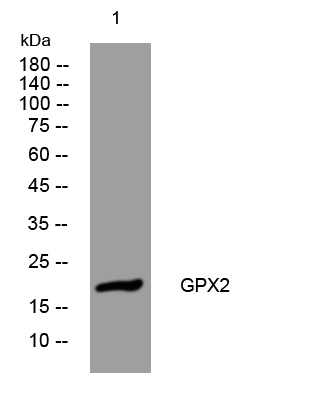GPX2 rabbit pAb
- Catalog No.:YT6350
- Applications:WB
- Reactivity:Human;Mouse;Rat
- Target:
- GPX2
- Fields:
- >>Glutathione metabolism;>>Arachidonic acid metabolism;>>Metabolic pathways;>>Thyroid hormone synthesis;>>Amyotrophic lateral sclerosis;>>Huntington disease;>>Pathways of neurodegeneration - multiple diseases
- Gene Name:
- GPX2
- Protein Name:
- GPX2
- Human Gene Id:
- 2877
- Human Swiss Prot No:
- P18283
- Mouse Gene Id:
- 14776
- Mouse Swiss Prot No:
- Q9JHC0
- Rat Swiss Prot No:
- P83645
- Immunogen:
- Synthesized peptide derived from human GPX2 AA range: 113-163
- Specificity:
- This antibody detects endogenous levels of GPX2 at Human/Mouse/Rat
- Formulation:
- Liquid in PBS containing 50% glycerol, 0.5% BSA and 0.02% sodium azide.
- Source:
- Polyclonal, Rabbit,IgG
- Dilution:
- WB 1:500-2000
- Purification:
- The antibody was affinity-purified from rabbit antiserum by affinity-chromatography using epitope-specific immunogen.
- Concentration:
- 1 mg/ml
- Storage Stability:
- -15°C to -25°C/1 year(Do not lower than -25°C)
- Molecular Weight(Da):
- 21kD
- Background:
- The protein encoded by this gene belongs to the glutathione peroxidase family, members of which catalyze the reduction of organic hydroperoxides and hydrogen peroxide (H2O2) by glutathione, and thereby protect cells against oxidative damage. Several isozymes of this gene family exist in vertebrates, which vary in cellular location and substrate specificity. This isozyme is predominantly expressed in the gastrointestinal tract (also in liver in human), is localized in the cytoplasm, and whose preferred substrate is hydrogen peroxide. Overexpression of this gene is associated with increased differentiation and proliferation in colorectal cancer. This isozyme is also a selenoprotein, containing the rare amino acid selenocysteine (Sec) at its active site. Sec is encoded by the UGA codon, which normally signals translation termination. The 3' UTRs of selenoprotein mRNAs contain a conserved stem-loop structure, designated the Sec insertion sequence (SECIS) element, that is necessary for the recognition of UGA as a Sec codon, rather than as a stop signal. Alternatively spliced transcript variants have been found for this gene. [provided by RefSeq, Jul 2016],
- Function:
- catalytic activity:2 glutathione + H(2)O(2) = glutathione disulfide + 2 H(2)O.,function:Could play a major role in protecting mammals from the toxicity of ingested organic hydroperoxides. Tert-butyl hydroperoxide, cumene hydroperoxide and linoleic acid hydroperoxide but not phosphatidycholine hydroperoxide, can act as acceptors.,similarity:Belongs to the glutathione peroxidase family.,subcellular location:Mainly cytoplasmic.,subunit:Homotetramer.,tissue specificity:Mostly in liver and gastrointestinal tract, not found in heart or kidney.,
- Subcellular Location:
- Cytoplasm, cytosol .
- Expression:
- Mostly in liver and gastrointestinal tract, not found in heart or kidney.
- June 19-2018
- WESTERN IMMUNOBLOTTING PROTOCOL
- June 19-2018
- IMMUNOHISTOCHEMISTRY-PARAFFIN PROTOCOL
- June 19-2018
- IMMUNOFLUORESCENCE PROTOCOL
- September 08-2020
- FLOW-CYTOMEYRT-PROTOCOL
- May 20-2022
- Cell-Based ELISA│解您多样本WB检测之困扰
- July 13-2018
- CELL-BASED-ELISA-PROTOCOL-FOR-ACETYL-PROTEIN
- July 13-2018
- CELL-BASED-ELISA-PROTOCOL-FOR-PHOSPHO-PROTEIN
- July 13-2018
- Antibody-FAQs
- Products Images

- Western blot analysis of lysates from U2OS cells, primary antibody was diluted at 1:1000, 4°over night



